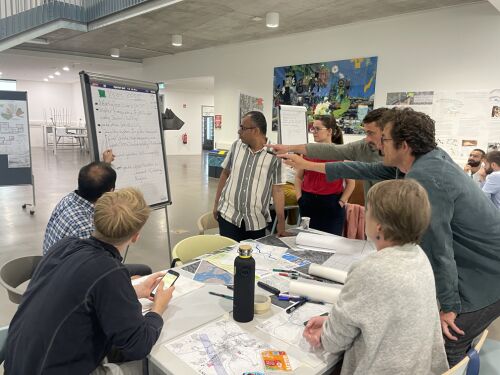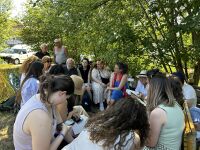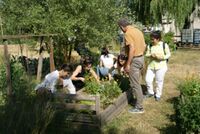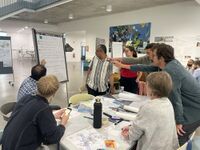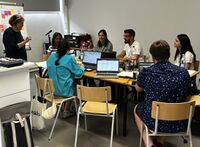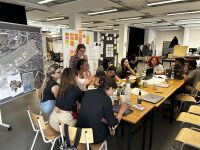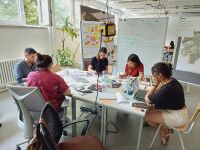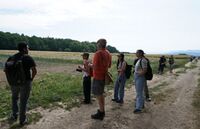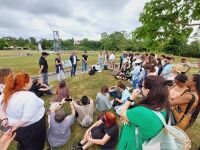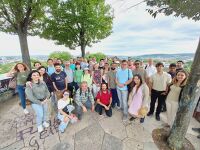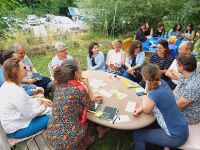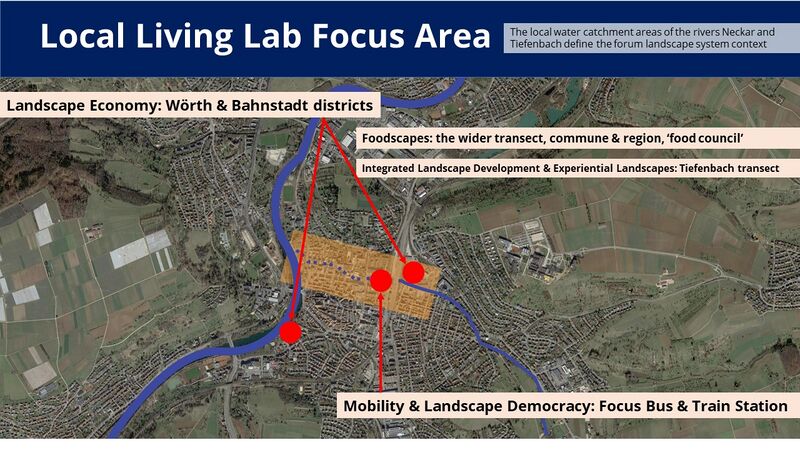TELOS Summer School 2023
Time frame of the TELOS Blended Intensive Programme 2022-2023
- TELOS Seminar online phase: Implemented in the period October 2022 – January 2023
- Access readings and lecture materials from the online part
- Onsite phase: June 24 – July 3, 2023 at HfWU Nürtingen-Geislingen, Nürtingen, Germany
- Participants: 45 staff and students from all TELOS project partners.
The intensive programme was integrated into the Landscape Forum Stuttgart Region and also included a TELOS Multiplier Event to present and discuss the current status of the TELOS curriculum. The summer school took place during the first festival summer of IBA’27, the International Building Exhibition of Stuttgart Region.
Learning Goals of the TELOS Intensive Study Programme
- Further competence development towards the TELOS learning goals by applying TELOS methods and approaches to the real-world context of the Living Lab
- Design, communication and reflection of innovative spatial approaches
- Generate positive impact on the local sustainable development discourse by generating new visions, ideas and examples.
Spatial context of the TELOS Blended Intensive Programme
- During the workshop, we will apply a multi-scale and systemic approach to the urban landscape of Nürtingen in Germany. Nürtingen is a middle-sized commune of 42.000 inhabitants. It is part of the urban agglomeration of Stuttgart. This area is home to 2.7 million people distributing across the 179 communes of Stuttgart Greater Region.
Impressions
TELOS working groups and themes
Taking these global and regional trends and challenges into account, we worked locally at four levels:
Addressing the housing challenge
Nürtingen is facing the challenge of relatively low housing density and dispersed structures. Access to affordable housing is getting more and more difficult, which is why urban green spaces are often the first choice for densification. Design question: How might we generate new housing opportunities without consuming more open and green spaces? Tutors were Juanjo Galan & Karolina Krosnicka, Gabriela Rembarz
>>> Download Working Group Final Presentation
>>> Download Working Group Report
Addressing the energy challenge
Based on the case of a new district development, Bahnstadt Nürtingen, we will explore the concept of ‘Positive Energy Districts’. How might this concept be transferred to the new district development? What would be the role of the neighboring district in this? Tutors were Maria Beatrice Andreucci, Dorothee Apfel, Giulia Maredda, Dorota Wojtowicz-Jankowska
>>> Download Working Group Final Presentation
>>> Download Working Group Report
Addressing the urban open space challenge
Nürtingen has limited access to public urban green spaces which is a challenge to social and environmental quality and limiting its climate resilience capacity. We will explore the territory of the Wörth district. How might we develop this area into a relevant urban green blue infrastructure? Which design would be suitable? Which benefits could be derive and quantify? Tutors were Ellen Fetzer, Romina D’Asciano, Salma Samaha
>>> Download Working Group Final Presentation
Addressing the financing & management challenge
If we imagine the Wörth area as a community-based public park, deep social and organisational innovation is needed. How would a community park work? How will they be organized? What are the financing mechanisms? Which innovative forms of collaboration do we need? Tutors were Dirk Funck & Beata Dreksler
>>> Download Working Group Final Presentation (combined with previous theme)
>>> Download Working Group Report (combined with previous theme)
Involvement in other forum working groups
In addition, some TELOS staff and students joined landscape forum working groups.
Integrated landscape development along the Tiefenbach Valley
Tutors were Veli Ortacesme and Stefanie Schur
>>> Download Working Group Final Presentation
Sustainable Mobility
Tutors were Didier Vancutsem, Henning Krug and Claire Pilgrims
>>> Download Working Group Final Presentation
Foodscapes
Tutors were Jeroen de Vries, Roxana Triboi, Meryem Atik and Ibrahim Yilmaz
>>> Download Working Group Final Presentation
Outcomes were
- A pre- and post reflection of all participants
- An example for an overall open and green space development strategy for Nürtingen
- Conceptual, spatial, technological and organizational ideas for a positive energy district in the Bahnstadt development area, including a preliminary cost-benefit analysis
- Conceptual, spatial, technological and organizational ideas for a community park on the river Neckar as a nature-based solution, including a preliminary cost-benefit analysis
- Business and Cooperation Models for the two case study areas
Which trends and developments are relevant for Stuttgart Region?
- In total, Stuttgart region is not aging as much as other European/German regions, because many people are constantly migrating into the region. They come from Europe and the world. Stuttgart is one of the most international regions in Germany.
- This leads to strong pressures on the housing market and the public services, especially schools and kindergardens. This is likely to increase even further. There is a strong need for innovation of the housing sector. Many districts are characterized by low density with single family housing, which determines a highly unsustainable lifestyle
- Germany‘s biggest generation, those born around 1964, will retire within the next 10 years. Most of them have established their homes and will stay certainly stay in the region. At the same time, retirement phases as getting longer because of improving health conditons & better health-related services.
- Next to the constant influx of skilled international labour force on the job market, the region will have to integrate an increasing number of people with a forced migration background. Increasingly, migration will have environmental causes.
- Open landscapes and urban open space will need to be redesigned for climate adaptation, local resource cycles (food, energy, materials), social inclusion and health providing functions.
- Competition for space and resources will increase, accelerate social exclusion and undermine social cohesion.
- Carbon-based economies and energy-supplies must disappear by 2050 (EU Goal). This will further transform our landscapes and cityscapes since renewable energy sources have to be integrated.
- Systemic changes of the regional mobility bear the potential of liberating a substantial amount of space to accommodate future needs. A key questions is: What will be the role of mobility in the future working world? Can we still repair the functional divide we got through 20th century modernist urbanism? This divide is shaping the region intensively.
- Any transformation of production, housing or mobility needs to be organised within the given space, to avoid any further land consumption. This will raise strong conflicts of interest. And it might not work at all.
- Overall, the demographic change towards an ageing society will become challenging for democratic decision-making. What will be the interests of the majorities?
- Economies with a strong dependence on international export and import will be subject to unpredictable geopolitical changes.
- More regional, circular, local economies might appear because of our own initiative or because we will be forced to have them. In any case, these circular processes will require a reorganisation of the regional landscape.
Wider Context of the TELOS Landscape Economy Programme
- TELOS ERASMUS courses contribute to the EU’s environmental and climate goals by means of systemic innovation, in line with the Green New Deal. The TELOS curriculum aims at educating a new generation of professionals that is able to conceive, design and implement innovative practices in urban land use in a cross-sectoral way.
- Unsustainable urban and peri-urban land use is a major driving force in the wicket system context of climate change. Much of our existing patterns and habits hamper the implementation of the EU’s climate adaptation and mitigation goals. The following factors play together here: mobility schemes based on individual cars, low density housing, territorial fragmentation by roads and grey infrastructure, continuous land consumption and green field developments reducing the EU’s soil resources, destruction and insufficient validation of green spaces, high energy consumption of the existing built fabric. Likewise, everybody’s individual consumption patterns are part of the problem.
- These patterns are partly self chosen and partly determined by the built environment and wrong planning decisions of the past.
- In order to address this wicked problem, the TELOS curriculum brings key disciplines together that have a direct impact on the structure and functionality of our environment: urban planning, architecture, landscape design, real estate development, agriculture and business administration.
- With the TELOS curriculum people will learn about the systemic connectivity of their fields and the need to collaborate towards innovation for sustainability. They will explore hidden trade-offs and synergies, based on joint goals. Keywords of the new solution fields are: circular economy, ecosystem services, green infrastructure, sustainable housing, digitalisation and smart city applications, all combined with democratic leadership skills, creative financing models, and governance innovation.
- Today’s most pressing sustainability challenges require developing the capacity to lead collaboratively and to effectively work across sectors and countries. We need effective new solutions to challenging and often systemic territorial problems in support of social and environmental progress.
- The TELOS course builds on real-world contexts. Methods and theories have to be applied to defined territorial contexts, including local stakeholders and communities. Civic engagement will be addressed in the TELOS Living Labs during which staff and students will have the opportunity to involve civil society and diverse local stakeholders into a co-creation process for generating innovative landscape economy approaches.
- TELOS contributes to the New European Bauhaus initiative, connecting the European Green Deal to our living spaces. It calls on all Europeans to imagine and build together a sustainable and inclusive future that is beautiful for our eyes, minds, and souls.
TELOS ERASMUS+ Partnership and Cooperation Project

